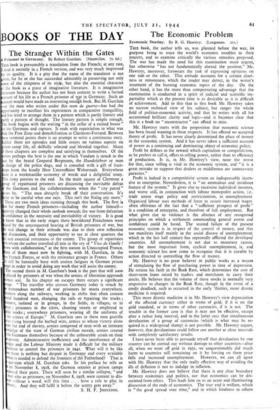OOKS
The .Stranger Within the Gates
Prisoner in Germany. By Robert Guerlain. (Macmillan. 7s. 6d.) ins book is presumably a translation from the French; at any rate, read it recently in a French version, and was very much impressed y its quality. It is a pity that the name of the translator is not yen, for he or she has succeeded admirably in preserving not only ome of the crispness of its style, - but also the essential character
f the book as a piece of imaginative literature. It is imaginative erature because the author has not been content to write a factual count of his life as a French prisoner ofNy,pr in Germany. Such an ount would have made an interesting enouTh book. But M. Guerlain r the man who writes under this nom de guerre—has had the pportunity to recollect his experiences in comparative tranquillity, d has tried to arrange them in a pattern which is partly literary and artly a pattern of thought. The literary pattern is simple enough. he book begins with the waiting " in the cellar of a ruined house " r the Germans and capture. It ends with repatriation to what was en the Free Zone and demobilisation at Clermont-Ferrand. Between e terminal points there is no attempt to write a continuous story. ather there are episodes and little essays on various aspects on rison camp life, all skilfully selected and blended together. Many
f these chapters are complete and satisfying in themselves. Of the ories perhaps the best is the one in which Vandam is struck in the ce by the brutal Corporal Bergmann, the Hundefiihrer or man charge of the police dogs, and is consoled with a gift of fruit- ops from the kindly Herr Unteroffizier Weberstedt. Everywhere re is a workmanlike economy of words and a delightful irony. his irony persists to the end. In the main square of Clermont a oup of repatriated prisoners are discussing the inevitable defeat the Germans and the collaborationists when the " city patrol " sses by. " The men abruptly break off their conversation. It's ter to be careful what one says. This isn't the Stalag any more." There are two main ideas running through this book. The first ig at for many ...French prisoners—including the author himself- ptivity changed their whole outlook towards the war from defeatism confidence in the necessity and inevitability of victory. It is good know that in the early stages these bewildered Frenchmen were Iped by the unconquered bearing of British prisoners of war, but
e real change in their attitude was due to their own reflection
d discussion, and their opportunity to see at close quarters the it and essential rottenness ot the enemy. The group ot repatriates th whom the author travelled all join in the cry of " Vive de Gaulle ! wn with collaboration," at the first station in Unoccupied France. any of them must now be fighting, with M. Guerlain, in the e French Forces, or with the resistance groups in France. Others 11 still be heroically busy with useless fatigues in German prison ps in order to avoid doing any work that will assist the enemy.
The second thesis in M. Guerlain's book is the part that will soon played by prisoners of war when the armies of liberation approach
man soil. In his chapter on escapes there occurs a significant age. " The traveller who crosses Germany today is struck by tremendous number of war prisoners he meets everywhere. soners along the railways, working in shifts that often contain eral hundred men, changing the rails or repairing the tracks ; soners, isolated or in groups, in the fields, in villages, or in sts ; prisoners in the cities, cleaning streets or employed in lic works ; everywhere prisoners, wearing all the uniforms of the armies of Europe." M. Guerlain sees in these men guerilla es rising beyond the barbed wire, armies to whom victory alone s the end of slavery, armies composed of men with an intimate wledge of the state of German civilian morale, armies created the Germans themselves because of the unbearable strain on their -power. Administrative inefficiency and the interference of the tapo and the Labour Ministry made it difficult for the military °tides to control the prisoners in 1941. What will it be like en there is nothing but despair in Germany and every available an is needed to defend the frontiers of the Fatherland? That is question which M. Guerlain asks. In his preface he tells us on November 8, 1918, the German sentries at prison camps doned their posts. There will soon be a similar collapse, " and men who as prisoners, on November 8, 1918, were content to dis- at without a word, will this time . . . have a role to play in any. And they will fulfil it before the sentry gets away."
S. H. F. JOHNSTON.






















 Previous page
Previous page